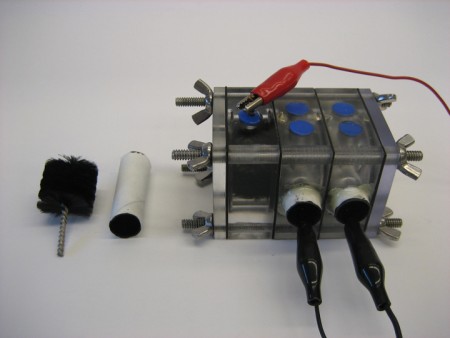
There are many of you out there who are adamant that hydrogen will never be a viable option as a fuel for anything. While hydrogen is the most common energy source for fuel cells, there is nothing magical about the most common element in the known universe that makes it the only possible choice for fuel cells. In fact fuel cells can be made to run on many fuels, such as natural gas, although hydrogen is preferred because the only thing emitted besides electricity is water.
A team at Penn State University has created a fuel cell that can generate electricity from bacteria. They used an anode made from a carbon-fiber bottle brush and a cathode made from a membrane tube. Putting the brush anode into the tube cathode and waste water through allows bacteria to collect on the large surface area of the brush. The bacteria can consume organic matter from the water and pass electrons to the anode. The tubes are doped with a cobalt catalyst on the inner surface. The prototype unit produced 18 watts of electricity per 260 gallons of water and had a charge efficiency of seventy percent. The other benefit of this system is that the water is cleaned as well. Check out the full report at the Read link
[Source: Penn State Live]


Sign in to post
Please sign in to leave a comment.
Continue